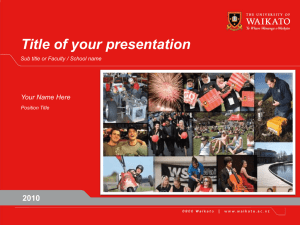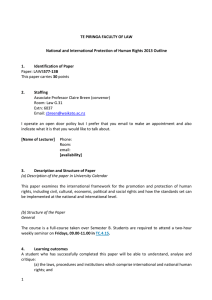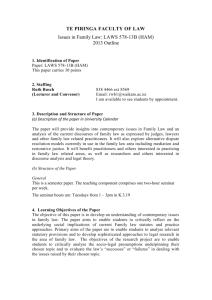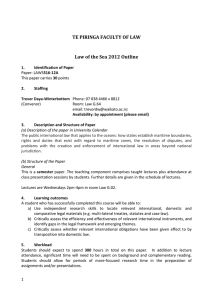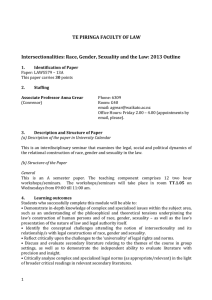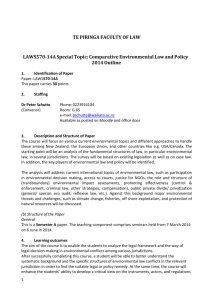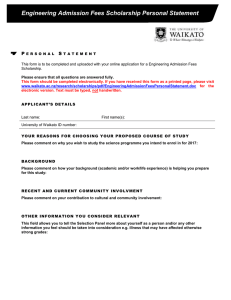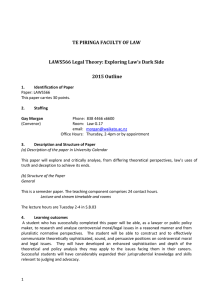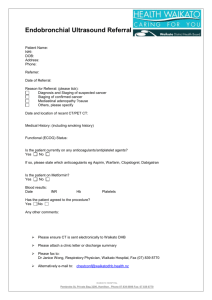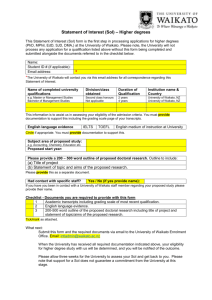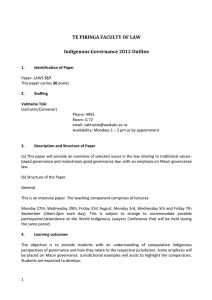LAWS515-13A LARCS
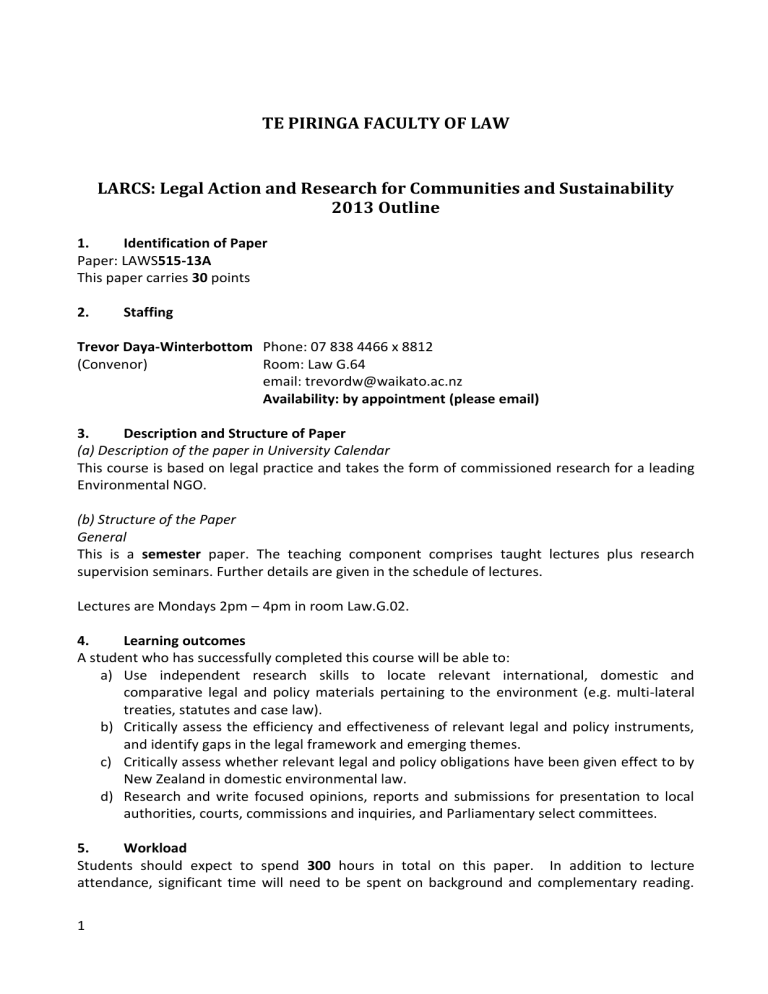
TE PIRINGA FACULTY OF LAW
LARCS: Legal Action and Research for Communities and Sustainability
2013 Outline
1. Identification of Paper
Paper: LAWS515-13A
This paper carries 30 points
2. Staffing
Trevor Daya-Winterbottom Phone: 07 838 4466 x 8812
(Convenor) Room: Law G.64 email: trevordw@waikato.ac.nz
Availability: by appointment (please email)
3. Description and Structure of Paper
(a) Description of the paper in University Calendar
This course is based on legal practice and takes the form of commissioned research for a leading
Environmental NGO.
(b) Structure of the Paper
General
This is a semester paper. The teaching component comprises taught lectures plus research supervision seminars. Further details are given in the schedule of lectures.
Lectures are Mondays 2pm – 4pm in room Law.G.02.
4. Learning outcomes
A student who has successfully completed this course will be able to: a) Use independent research skills to locate relevant international, domestic and comparative legal and policy materials pertaining to the environment (e.g. multi-lateral treaties, statutes and case law). b) Critically assess the efficiency and effectiveness of relevant legal and policy instruments, and identify gaps in the legal framework and emerging themes. c) Critically assess whether relevant legal and policy obligations have been given effect to by
New Zealand in domestic environmental law. d) Research and write focused opinions, reports and submissions for presentation to local authorities, courts, commissions and inquiries, and Parliamentary select committees.
5. Workload
Students should expect to spend 300 hours in total on this paper. In addition to lecture attendance, significant time will need to be spent on background and complementary reading.
1
Students should allow for periods of more-focused research time in the preparation of assignments and/or presentations.
6. Required and Recommended Reading
All law students are required to purchase, for use in all law papers, a copy of McLay, Murray &
Orpin, New Zealand Law Style Guide, Thomson Reuters (2009). This is available from Bennetts, at an approximate price of $18.90.
In addition to the texts identified below, the Law School requires that students purchase the course materials book(s) for this paper. These are available from Waikato Print.
Recommended reading:
T Daya-Winterbottom (Editor) Frontiers of Resource Management Law (2012) Thomson Reuters pp554
T Daya-Winterbottom (Editor) The Salmon Lectures – Justice and the Environment (2012)
Thomson Reuters pp118
Both books are available from the Resource Management Law Association of New Zealand.
Contact RMLA Executive Officer, Karol Helmink, by email: karol.helmink@xtra.co.nz, to order copies.
Further material may be provided on the paper site on Moodle (http://elearn.waikato.ac.nz), the
University of Waikato’s online learning system. Any such material is provided on the following terms:
University of Waikato owns the intellectual property rights, including copyright, in and to this site, or has acquired the necessary licenses to display the material on the site. As a student of the Te
Piringa Faculty of Law, you are granted a limited license to use (access, display or print a single copy) the material from the papers in which you are enrolled for the purposes of participating in the paper only, provided the information is not modified. Materials may not under any circumstances be copied, stored, distributed or provided in any form or method whatsoever to any third party. Any other use of the material is prohibited. None of the material may be otherwise reproduced, reformatted, republished or re-disseminated in any manner or form without the prior written consent of University of Waikato. To obtain such consent, please contact the Te Piringa Faculty of Law.
7. Online support
Online support for this paper is provided via Moodle.
8. Assessment a) Requirements for assessed work
School procedures for the presentation of course work are set out in the Te Piringa Faculty of Law
Graduate and Postgraduate Handbook which is available from: http://www.waikato.ac.nz/law/graduate .
See also paragraph 12 below on referencing guidelines and plagiarism.
Assignment resources are available online at http://www.waikato.ac.nz/law/student/
2
Additional requirements:
For the research proposal and annotated bibliography the word count if 2,000 – 4,000 words, including footnotes or endnotes and bibliography.
For the research paper the word count is 8,000 – 10,000 words including footnotes or endnotes and bibliography. b) Coursework: Final Examination Ratio: 100/0 c) Assessment Components
Component
Research proposal
Percentage of overall mark
10%
Research paper
Presentation
80%
10% d) Handing in, marking time and collection
Due date
Friday 15 March
Friday 14 June
See lecture schedule
All assignments must be submitted electronically through Moodle ( http://elearn.waikato.ac.nz
).
See Te Piringa Faculty of Law Graduate and Postgraduate Handbook, available at http://www.waikato.ac.nz/law/graduate . Where practical, it is the policy of Te Piringa Faculty of
Law to return marked work to students within five weeks of submission.
If you require assistance with Moodle, or encounter any problems, please contact the Help Desk.
You can send a message to Help Desk by using the instant message service in your paper’s
Moodle site (from the participants list within the People block). Alternatively, you can email them directly at help@waikato.ac.nz or call 838 4008. e) Measurement of Achievement
Achievement in assignments and presentations will be measured in terms of levels of understanding and knowledge gained, in terms of the originality and the sophistication of analysis provided, in terms of coherent and logical structure, and in terms of the fluency and accuracy of expression and referencing. f) Management of assessment deadlines, process for requesting extensions and special consideration, and for appeals i) Extensions
Students are required to complete and submit all internal assessment by specified dates. The meeting of deadlines is a mark of professionalism and its enforcement is essential for fairness to all students taking the paper. Handing in course work on or before the due in date also facilitates the timely return of marked work by academic staff. Students should meet requirements as to time deadlines for course work, or make a request for an extension or special consideration in appropriate circumstances (see Graduate Programmes Manual available from the School of Law
Graduate website http://www.waikato.ac.nz/law/graduate/ .) Failure to comply with requirements as to the time deadlines for internal assessment without having successfully applied either for an extension or special consideration with supporting evidence before the due date will
3
result in deduction of 2.5 marks for each day the work is late. Lateness of more than a week may result in the work not being marked. No deadlines may be extended beyond two weeks after the last teaching day of the semester(s) in which the paper is taught as final grades must go to the
Board of Examiners at this time. Unless an extension in writing has been granted, a lecturer may refuse to accept a piece of work which is submitted after the specified date, and automatically award it no mark, or may lower the mark as a penalty for lateness.
Applications for extension, on the form obtainable from the Resource Room, must be submitted to the Convenor of the course. Extensions will be granted only on evidence of illness, family bereavement, or serious personal accidents or circumstances. Please note that too many assignments due at the same time is NOT an acceptable reason, neither are claims that computers and/or printers have crashed). Account will be taken of the time in which the student has had to complete the assessment before the supervening event occurred. It will be important to consider if the grant of the extension will give the student in question an unfair advantage over other students. A maximum period of 14 days will be given as an extension unless there are exceptional circumstances. In determining applications the Convenor or lecturer of the relevant paper may consult with the Chief Examiner or nominee. ii) Special Consideration
The Assessment Regulations 2005 as set out in the University Calendar 2013 list in detail the university-wide policies and procedures, which apply concerning missed examinations, impaired performance or impaired preparation time for an examination, and missed or impaired course work. Students are responsible for ensuring that they comply with these regulations. Application forms for special consideration for internal assessment are available from the Resource Room. iii) Appeals (University Calendar 2013, Assessment Regulations 2005, Reg. 24)
A student may appeal against any decision taken under these regulations.
An appeal, comprising a written statement of the circumstances of the appeal, together with supporting evidence if available, must be submitted by the student in writing to the Director of
Student & Academic Services not more than seven days after the date on which notification of the relevant decision is received.
Appeals under this section are considered and decided by the Deputy Vice-Chancellor by delegated authority of the Academic Programmes Committee.
A decision by the Deputy Vice-Chancellor is notified in writing, and is final.
9. University Calendar Regulations and Policies
Your attention is drawn to the following regulations and policies, which are published in the
University Calendar 2013.
Assessment Regulations 2005
Student Discipline Regulations 2008
Computer Systems Regulations 2005
Policy on the Use of Māori for Assessment
Student Research Regulations 2008
Ethical Conduct in Human Research and Related Activities Regulations 2008.
10. Links to other papers
4
None.
11. Fees
Refer to http://calendar.waikato.ac.nz/admission/tableoffeesandcharges.html
.
12. Referencing guidelines and caution against plagiarism
(a) Referencing must be in accordance with the New Zealand Law Style Guide.
(b) All written work submitted for the purposes of assessment must be your own work.
Copying or paraphrasing all or part of another person’s work, be it published or unpublished, without clear attribution, is plagiarism. Plagiarism is misconduct and is dealt with under the disciplinary procedures of the University as outlined in the Student
Discipline Regulations 2008 in the University Calendar.
“Plagiarism means presenting as one’s own work the work of another, and includes the copying or paraphrasing of another person’s work in an assessment item without acknowledging it as the other person’s work through full and accurate referencing; it applies to assessment presented through a written, spoken, electronic, broadcasting, visual, performance or other medium.” See section 3, Assessment Regulations (2013 Calendar)
Unless approved otherwise by the examiners of the papers concerned, a student must not submit as assessment material that is substantially the same as material submitted as assessment for a different paper.
(c) The Te Piringa Faculty of Law’s policy regarding plagiarism is contained in the Te Piringa
Faculty of Law Graduate and Post-Graduate Handbook and the Te Piringa Faculty of Law
Graduate Programmes Manual, available from http://www.waikato.ac.nz/law/graduate/ .
13. Health and safety
The Law School’s Health and Safety representative is Ms Alison Saunders who is in Room Law G44 at ext 4167.
14. Class representation
At the commencement of the semester / intensive paper, a class representative will be elected by the students in [name of paper]. This representative is encouraged to communicate regularly with the Convenor. Students in this paper are encouraged to liaise with their representative to discuss issues of concern. Contact details for the Student Representation Coordinator, Academic
Services Division, are as follows: Samantha Whittle, Student Services, ext. 6264, CHSSG.25 email: student.reps@waikato.ac.nz
15. Complaints procedures
The brochure Student Concerns and Complaints Policy provides details of the University’s process for handling concerns and complaints and is available from Faculty and School Offices, The
Gateway and Student Services Division and is contained in the Calendar 2013. See also the document Student Support Structure at Te Piringa Faculty of Law, available from the Resource
Room.
5
Lecture Schedule A Semester
Week Commencing
25 Feb
4 March
11 March
18 March
25 March (29 March Good Friday)
1 April (1-2 Easter Monday and Holiday)
8 April
15 April
22 April (25 April ANZAC day)
29 April
6 May
13 May
20 May
27 May
3 June (3 June Queen’s Birthday)
Programme of lecture topics
Course outline (TDW)
Emerging themes in environmental law and policy (EDS)
Research sources and focused writing;
Comparative research methods
Research supervision seminar
Research supervision seminar
Research supervision seminar
Public Holiday
Research supervision seminar
Teaching Recess
Teaching Recess
Research supervision seminar
Research supervision seminar
Research supervision seminar
Presentations
Presentations
Study Week
6
